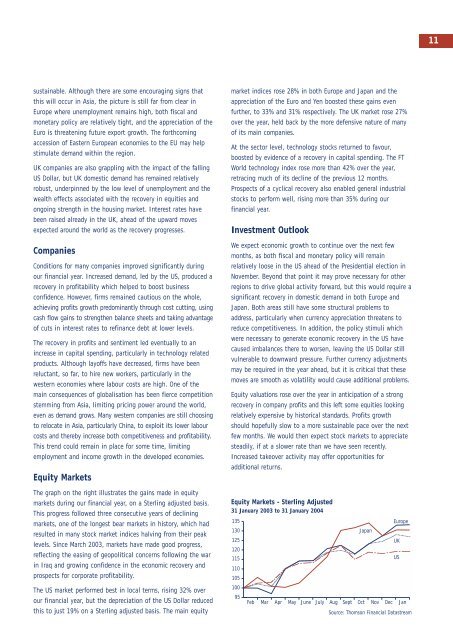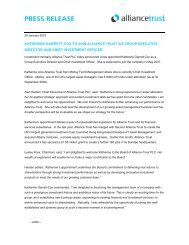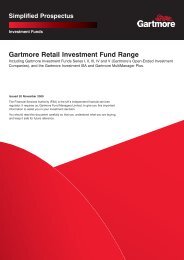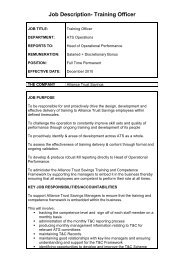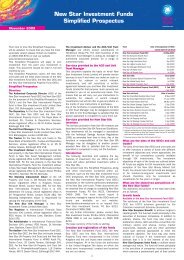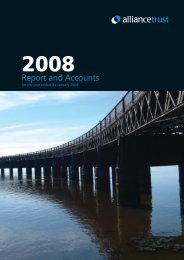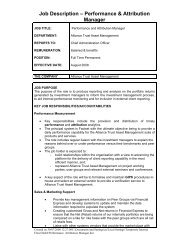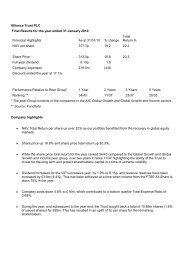Full Report - Alliance Trust
Full Report - Alliance Trust
Full Report - Alliance Trust
You also want an ePaper? Increase the reach of your titles
YUMPU automatically turns print PDFs into web optimized ePapers that Google loves.
11<br />
sustainable. Although there are some encouraging signs that<br />
this will occur in Asia, the picture is still far from clear in<br />
Europe where unemployment remains high, both fiscal and<br />
monetary policy are relatively tight, and the appreciation of the<br />
Euro is threatening future export growth. The forthcoming<br />
accession of Eastern European economies to the EU may help<br />
stimulate demand within the region.<br />
UK companies are also grappling with the impact of the falling<br />
US Dollar, but UK domestic demand has remained relatively<br />
robust, underpinned by the low level of unemployment and the<br />
wealth effects associated with the recovery in equities and<br />
ongoing strength in the housing market. Interest rates have<br />
been raised already in the UK, ahead of the upward moves<br />
expected around the world as the recovery progresses.<br />
Companies<br />
Conditions for many companies improved significantly during<br />
our financial year. Increased demand, led by the US, produced a<br />
recovery in profitability which helped to boost business<br />
confidence. However, firms remained cautious on the whole,<br />
achieving profits growth predominantly through cost cutting, using<br />
cash flow gains to strengthen balance sheets and taking advantage<br />
of cuts in interest rates to refinance debt at lower levels.<br />
The recovery in profits and sentiment led eventually to an<br />
increase in capital spending, particularly in technology related<br />
products. Although layoffs have decreased, firms have been<br />
reluctant, so far, to hire new workers, particularly in the<br />
western economies where labour costs are high. One of the<br />
main consequences of globalisation has been fierce competition<br />
stemming from Asia, limiting pricing power around the world,<br />
even as demand grows. Many western companies are still choosing<br />
to relocate in Asia, particularly China, to exploit its lower labour<br />
costs and thereby increase both competitiveness and profitability.<br />
This trend could remain in place for some time, limiting<br />
employment and income growth in the developed economies.<br />
Equity Markets<br />
The graph on the right illustrates the gains made in equity<br />
markets during our financial year, on a Sterling adjusted basis.<br />
This progress followed three consecutive years of declining<br />
markets, one of the longest bear markets in history, which had<br />
resulted in many stock market indices halving from their peak<br />
levels. Since March 2003, markets have made good progress,<br />
reflecting the easing of geopolitical concerns following the war<br />
in Iraq and growing confidence in the economic recovery and<br />
prospects for corporate profitability.<br />
The US market performed best in local terms, rising 32% over<br />
our financial year, but the depreciation of the US Dollar reduced<br />
this to just 19% on a Sterling adjusted basis. The main equity<br />
market indices rose 28% in both Europe and Japan and the<br />
appreciation of the Euro and Yen boosted these gains even<br />
further, to 33% and 31% respectively. The UK market rose 27%<br />
over the year, held back by the more defensive nature of many<br />
of its main companies.<br />
At the sector level, technology stocks returned to favour,<br />
boosted by evidence of a recovery in capital spending. The FT<br />
World technology index rose more than 42% over the year,<br />
retracing much of its decline of the previous 12 months.<br />
Prospects of a cyclical recovery also enabled general industrial<br />
stocks to perform well, rising more than 35% during our<br />
financial year.<br />
Investment Outlook<br />
We expect economic growth to continue over the next few<br />
months, as both fiscal and monetary policy will remain<br />
relatively loose in the US ahead of the Presidential election in<br />
November. Beyond that point it may prove necessary for other<br />
regions to drive global activity forward, but this would require a<br />
significant recovery in domestic demand in both Europe and<br />
Japan. Both areas still have some structural problems to<br />
address, particularly when currency appreciation threatens to<br />
reduce competitiveness. In addition, the policy stimuli which<br />
were necessary to generate economic recovery in the US have<br />
caused imbalances there to worsen, leaving the US Dollar still<br />
vulnerable to downward pressure. Further currency adjustments<br />
may be required in the year ahead, but it is critical that these<br />
moves are smooth as volatility would cause additional problems.<br />
Equity valuations rose over the year in anticipation of a strong<br />
recovery in company profits and this left some equities looking<br />
relatively expensive by historical standards. Profits growth<br />
should hopefully slow to a more sustainable pace over the next<br />
few months. We would then expect stock markets to appreciate<br />
steadily, if at a slower rate than we have seen recently.<br />
Increased takeover activity may offer opportunities for<br />
additional returns.<br />
Equity Markets - Sterling Adjusted<br />
31 January 2003 to 31 January 2004<br />
135<br />
130<br />
125<br />
120<br />
115<br />
110<br />
105<br />
100<br />
95<br />
Japan<br />
Europe<br />
Feb Mar Apr May June July Aug Sept Oct Nov Dec Jan<br />
UK<br />
US<br />
Source: Thomson Financial Datastream


